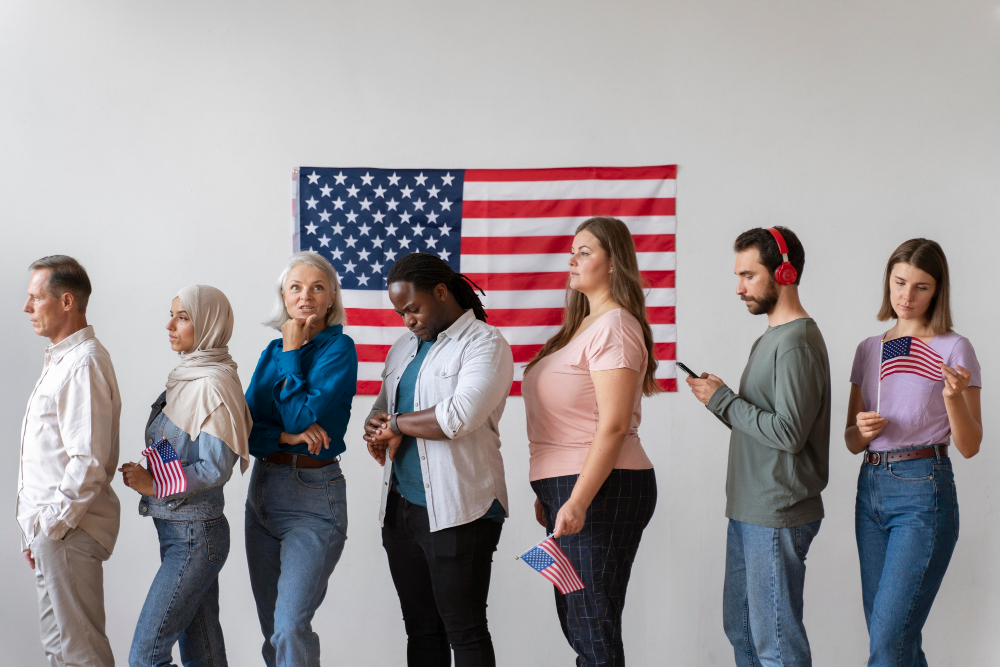Social media platforms have been rife with misinformation regarding early voting in Texas, particularly during the 2024 election cycle. One prevalent rumor involved text messages warning voters that any markings on their ballots, such as letters or symbols, would lead to disqualification.
The Harris County Clerk’s office refuted this claim, clarifying that ballots are required to bear the initials of election officials as per the Texas Election Code, and such markings do not invalidate the ballot .
Another widespread falsehood suggested that voting machines were “flipping” votes. Election security experts and officials have consistently debunked these allegations, attributing isolated incidents to human error rather than machine malfunction or tampering .
In Tarrant County, for instance, a voter’s claim of a misrecorded presidential choice was investigated and found to be a user error; the voter was allowed to correct the mistake .
The Texas Secretary of State’s office has implemented robust measures to ensure election integrity, including background checks for election personnel, post-election audits, and partnerships with cybersecurity agencies .
Despite these safeguards, misinformation continues to spread, often amplified by coordinated networks of fake accounts on social media platforms .
The Myth of Limited Early Voting Locations.
Social media myths often suggest that early voting in Texas is constrained by a lack of available locations. In reality, Texas boasts a robust network of early voting sites designed to accommodate voters across the state.
During the early voting period, which typically spans two weeks leading up to Election Day, Texans can find numerous locations in their communities. From public libraries to community centers, these sites are strategically placed to ensure accessibility for all voters.
To locate early voting locations, voters can rely on official resources such as the Texas Secretary of State’s website. This platform offers an interactive map where voters can input their address to find nearby early voting sites. Additionally, local election offices provide information through social media and community outreach efforts.
By utilizing these resources, voters can easily identify where and when they can cast their ballots, thus eliminating confusion stemming from social media rumors.
The impact of accessible early voting locations on voter turnout cannot be overstated. Studies show that when voters have convenient access to polling places, they are more likely to participate in elections.
In Texas, the expansion of early voting sites has led to increased participation among diverse demographics, including younger voters and those from historically underrepresented communities. By dispelling the myth of limited early voting locations, we can empower more Texans to exercise their right to vote and engage in the democratic process.
Rumor: Early Voting is Only for Certain Voters.
Many social media posts spread the false narrative that early voting in Texas is restricted to specific groups of voters. This misconception can deter eligible citizens from participating in the electoral process.
In reality, any registered voter in Texas can take advantage of early voting, regardless of their demographic background or political affiliation. The Texas Secretary of State’s office clearly outlines that all voters have the right to cast their ballots early, providing a crucial opportunity for those who may face challenges on Election Day.
Debunking this myth is essential for fostering civic engagement. When voters believe they are ineligible for early voting, they may miss out on the chance to make their voices heard.
For example, students studying away from home or individuals with work commitments may find it difficult to vote on the official Election Day. By clarifying that early voting is available to everyone, we empower these individuals to participate fully in the democratic process.
Educating voters about their rights is critical in combating election misinformation. Community organizations and local officials play a vital role in disseminating accurate information.
They can host workshops or distribute flyers that explain the early voting process and its accessibility. This proactive approach ensures that all Texans understand their voting options and can exercise their right without confusion or fear of restriction.
In summary, the rumor that early voting is only for certain voters undermines democracy and voter participation. By addressing this misconception head-on, we can encourage more individuals to engage with the electoral process. Every eligible Texan deserves the chance to vote, and it’s our collective responsibility to ensure they know it.
Misconception: Early Voting Leads to Increased Fraud.
Many individuals express concerns that early voting contributes to higher rates of election fraud. However, a closer look at the statistics reveals a different narrative. Studies show that instances of voter fraud during early voting in Texas are exceedingly rare.
According to the Texas Secretary of State, the state has seen a fraud rate of less than 0.01% in recent elections, indicating that fears surrounding early voting are largely unfounded. This low rate underscores the integrity of the electoral process and dispels myths propagated on social media.
Texas takes significant measures to safeguard against voter fraud. The state employs various verification methods, including requiring voters to present identification and maintaining secure voting systems.
Additionally, election officials monitor early voting locations closely, ensuring compliance with all regulations. These safeguards demonstrate Texas’s commitment to upholding voting rights while ensuring fair and transparent elections. The system is designed to protect every legitimate vote without infringing on the access rights of voters.
Addressing concerns regarding early voting requires presenting evidence-based facts rather than relying on anecdotal claims. Research consistently shows that early voting does not lead to increased fraud but instead expands access to the polls for many voters.
By allowing Texans to cast their ballots at their convenience, early voting enhances civic engagement and participation. It’s essential for voters to rely on verified information rather than social media rumors, which can cloud understanding and discourage participation in the democratic process.
In summary, the misconception that early voting leads to increased fraud lacks substantial evidence. Instead, Texas implements robust measures to ensure election integrity while promoting voter access.
Fact-checking these claims is crucial for empowering voters and reinforcing confidence in the electoral system. As citizens engage with the democratic process, they must rely on accurate information to uphold their rights and responsibilities as voters.
Social Media Claims on Identification Requirements.
As Texas elections 2023 approach, social media platforms buzz with claims about identification requirements for early voting. Many users spread misinformation, suggesting that the rules are overly stringent or unclear. However, the reality is more straightforward.
In Texas, voters must present an acceptable form of photo identification when voting, whether during early voting or on Election Day. Acceptable forms include a Texas driver’s license, a Texas personal identification card, or even a U.S. passport. Understanding these requirements ensures voters can confidently participate in the electoral process.
It’s essential to note that while the ID requirements for early voting align closely with those for Election Day, there are some nuances to consider. For instance, if a voter does not possess an acceptable ID, they can still cast a provisional ballot by signing a declaration.
This provision allows them to present an acceptable ID later for their vote to be counted. By clarifying these details, Texas aims to foster inclusivity and ensure that all eligible voters can access their rights without unnecessary barriers.
To further assist voters, numerous resources outline voter ID laws and requirements in Texas. The Texas Secretary of State’s website provides comprehensive information on acceptable forms of ID and the process for casting a provisional ballot.
Additionally, local election offices are invaluable resources for answering specific questions and providing guidance. By empowering voters with accurate information about ID requirements, we can combat misinformation and promote higher participation rates in the upcoming elections.
Staying informed is crucial, especially as social media continues to shape public perceptions of voting processes.
Engaging with credible sources helps dispel myths surrounding voter identification and strengthens the integrity of Texas elections 2023. Voters should feel confident in their ability to navigate early voting and understand what is required to make their voices heard.
The False Narrative of Early Voting Favoring One Party.
Social media often perpetuates the myth that early voting in Texas disproportionately benefits one political party over another. This narrative, however, does not hold up under scrutiny. An examination of voting patterns during early voting periods reveals a more nuanced picture.
Data from previous elections shows that both major political parties engage their supporters during this time, leading to a diverse turnout that reflects the state’s varied political landscape.
In fact, early voting provides an opportunity for all voters, regardless of party affiliation, to participate in the electoral process without the pressure of long lines on Election Day.
Non-partisan data further illustrates that demographics among early voters encompass a wide range of backgrounds and political beliefs. Reports from organizations such as the Texas Secretary of State highlight that early voting attracts a broad spectrum of participants, including young voters, minorities, and first-time voters.
This diversity challenges the notion that one party holds a monopoly over early voting advantages. By recognizing these trends, voters can appreciate the inclusive nature of the early voting system and understand that it serves the interests of all Texans.
Encouraging a balanced view of the voting process is crucial. Misleading narratives can discourage voter participation, ultimately impacting voter turnout. When individuals believe that their votes may not count or that the process is skewed, they may choose to abstain from voting altogether.
It is vital for voters to engage with accurate information and recognize the importance of their participation in shaping the state’s future. By dispelling myths about early voting favoring one party, we empower Texans to exercise their rights confidently and collectively as informed citizens.
As discussions around early voting continue, it is essential to rely on facts rather than unfounded claims. Fact-checking social media rumors allows voters to make informed decisions and encourages civic engagement across the board. Emphasizing the reality of early voting’s inclusivity will lead to greater participation and a healthier democracy in Texas.
Debunking the Myth of Early Voting Being Complicated.
Many first-time voters fear that the early voting process is daunting or overly complicated. This myth can discourage participation, but understanding the steps involved can empower voters.
Early voting in Texas is designed to be accessible and straightforward, allowing individuals to cast their ballots ahead of Election Day without unnecessary hurdles. With a little preparation, anyone can navigate the process with confidence.
To participate in early voting, follow these simple steps: First, check the early voting schedule for your county. In Texas, early voting typically begins 17 days before an election and ends 4 days before.
Next, locate your designated early voting site using the Texas Secretary of State’s website or your local election office. Bring an acceptable form of ID, such as a Texas driver’s license or a voter ID card. When you arrive at the polling location, you’ll check in, receive your ballot, and cast your vote—all in a matter of minutes.
If you need assistance or have questions about the early voting process, several resources are available. The Texas Secretary of State’s website offers comprehensive guides and FAQs to help voters understand their rights and responsibilities.
Local civic organizations also provide workshops and informational sessions aimed at demystifying the voting experience. These resources ensure that no one has to feel lost or confused when participating in this vital democratic process.
By myth-busting the notion that early voting is complicated, we can encourage more Texans to engage in the electoral process. Empowering voters with accurate information leads to higher turnout and strengthens our democracy. Remember, every vote counts, and being informed is the first step toward making your voice heard.
Importance of Fact-Checking Before Sharing.
In an age where social media dominates communication, the spread of misinformation can significantly impact voter behavior and perceptions. Before hitting the share button, it’s crucial to engage in critical thinking and verify sources.
For instance, a single misleading post claiming limited early voting options in Texas can discourage potential voters from casting their ballots. By taking a moment to fact-check such claims, individuals can help foster a more informed electorate.
Several reliable tools and websites exist to assist in verifying information related to early voting and other electoral processes. Resources like Snopes, FactCheck.org, and the Texas Secretary of State’s website provide accurate data on various election-related topics.
These platforms allow users to cross-reference social media posts with verified information, enabling a clearer understanding of the realities surrounding early voting. Engaging with these resources helps individuals separate fact from fiction and empowers them to share only verified information.
Promoting responsible sharing practices is essential in combating misinformation. Encourage friends and family to check the validity of claims before disseminating them further. Simple actions, like asking questions about the source or looking for supporting evidence, can create a ripple effect that encourages accountability.
By prioritizing facts over sensationalism, Texas voters can contribute to a healthier democratic process and ensure that all citizens have access to accurate information about their rights and voting procedures.
Ultimately, fact-checking plays a vital role in civic engagement. It not only arms voters with the truth but also strengthens communities by fostering informed discussions.
As we navigate the complexities of early voting in Texas, let us commit to sharing only those narratives backed by solid evidence—because every vote deserves the power of accurate information.
Empowering Voters Through Accurate Information.
Accurate information plays a crucial role in civic engagement, especially during election periods. When voters have access to reliable facts, they can make informed decisions that reflect their values and priorities.
Misinformation can lead to confusion, apathy, and ultimately, lower voter turnout. By actively seeking out accurate sources, citizens fulfill their civic responsibility, ensuring their voices are heard in the democratic process. For instance, organizations like the League of Women Voters provide non-partisan guides that help voters understand their rights and the voting process.
Staying informed about upcoming elections is easier than ever thanks to numerous resources available online. Websites such as Vote.org and CanIVote.org offer comprehensive information on registration deadlines, polling locations, and early voting schedules tailored for Texas voters.
Social media platforms can also serve as valuable tools for disseminating accurate information, provided users verify the credibility of the content before sharing. Local news outlets frequently cover election updates, making them a reliable source for voters seeking timely information.
Communities thrive when individuals share factual information with one another. Engaging in conversations about voting rights and election procedures helps combat misinformation and empowers others to participate.
For example, hosting a community workshop or discussion group about the voting process can create a supportive environment where questions are answered, and knowledge is shared. By encouraging friends and family to verify information before passing it on, citizens can collectively foster a culture of informed civic participation.
As Texas voters prepare for upcoming elections, remember that being informed is not just a personal responsibility; it is a collective endeavor. Each individual has the power to contribute to a well-informed electorate. By prioritizing accurate information and sharing it within their communities, voters can strengthen democracy and ensure that every voice counts at the ballot box.
I am an accomplished author and journalist at Fact Finders Company . With a passion for research and a talent for writing, I have contributed to numerous non-fiction titles that explore a wide range of topics, from current events, politics and history to science and technology. My work has been widely praised for its accuracy, clarity, and engaging style. Nice Reading here at Fact After Fact.








